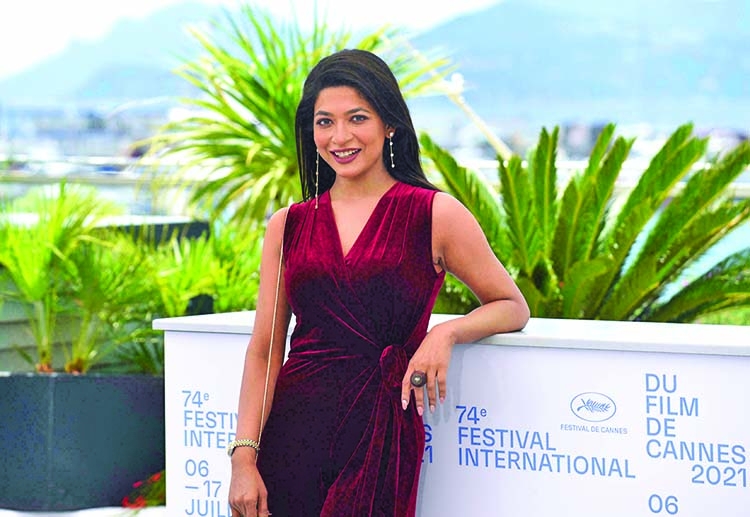Standing ovation at Cannes validated my 3-yr fight against patriarchy and depression

In an intricate Dhakai jamdani and a stunning metallic embellished halter-neck blouse, Bangladeshi actress Azmeri Haque Badhon was at the 74th Cannes Film Festival carrying Bengali tradition with pride. "It was so nice to wear my deshi Dhakai Jamdani at the event," the actress said. Badhon, along with filmmaker Abdullah Mohammad Saad and other team members, attended the festival with Rehana Maryam Noor, Bangladesh's first entry to Cannes.
The film follows the life of a 37-year-old medical professor who is pitted against deep-rooted patriarchy when she decides to fight for a young student who is a victim of sexual assault. "With the standing ovation that lasted for more than five-six minutes I think, all my pains started to heal," said Badhon, who, in a candid chat with us from France, talked about her struggle as a female performer, her battle with depression, working with Srijit Mukherji and her journey to make a mark on a global platform. Excerpts:
Q. Your jamdani look has created quite a stir...
Badhon: Yes, I chose to wear this sari at the premiere of our film. Later, at the festival photocall, I wore a maroon ensemble. We did not attend the main red carpet. It was a conscious call by Saad, our director. Traditionally, only the producer, director and the main actor/actress are invited to the opening night. Since most of our team members would have had to give it a miss, Saad decided we won't go.
And then the film got a standing ovation at the festival... I am proud to be able to represent Bangladesh on an international platform. The film is an achievement and also a part of the history of Bangladesh now. This milestone validates all my struggle for three years. Today, the moment not only brings pride, but heals a lot of my pain and encourages me to work more.
Q. How did it feel when you first got to know about the selection at Cannes?
Badhon: I am a patient of chronic depression. The news and excitement that came along with it, triggered my depression and I had to take medication and start therapy. Truth is, this achievement was not an easy one - I had to go through intense struggle to get here.
Moreover, my character in the film, Rehana, is also very intense and demanding. When I was entering the hall, it felt like I was going to sit for an examination. Saad did not let me watch the film because of the realistic darkness that it portrays. He wanted me to watch it at the world premiere. While watching, I was in tears, reliving the gruelling shooting days and my past.
Then came the magic moment. After the film was over, I noticed the audience stood up and started clapping, which went on for five-six minutes. An elderly French woman came and hugged me, crying. All my tears of pain turned into tears of joy. Later that night, we went out for dinner. While returning, I bumped into another woman. I was in a mask and I said sorry. She turned around and said, 'Rehana?' My pains are all gone at least for now (laughs).
Q. What are these struggles that you speak of?
Badhon: For the last three years, I have been trying to live an independent life that I owe only to myself. Before that I lived for others, abiding by all societal norms. In our society, it is taken for granted that an actress in her 30s is redundant. More so, if you have a child. For the last three years, I tried to change this perception. I got married very early, soon after I finished my medical course (Badhon is a dental surgeon, who never practised). My life became very difficult after that.
In 2014, I got divorced and about three years ago, suddenly the father of my child decided to claim my daughter's (Sayera) custody. I had to fight a legal system that favours the father as the guardian of a child over the mother. Anyway, I got the custody. My nine-year-old daughter is not travelling with me now. She is at home in Bangladesh.
Q. In India, you have worked with Srijit Mukherji. How was your experience?
Badhon: Srijit did not know me. He saw me on social media and contacted me. In Bangladesh, while casting for a grey character, directors tend to play safe. They choose seasoned actors for nuanced roles so that nothing goes wrong. Srijit trusted me. He worked with me, rehearsed with me. The shooting experience was a mix of good and bad but the dedication and commitment I saw of the director was outstanding and that was also very encouraging.
Q. So you plan to work more in India…
Badhon: I believe an artiste cannot have any geographical boundary. One has to transcend. But for me, the director is very important. I am not a trained actress. And hence, I am a director's actress. Along with that, the character also matters a lot. If things fall into place, I will surely work in India.
